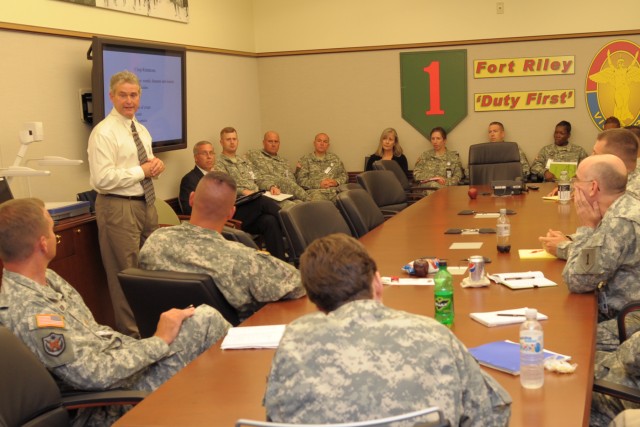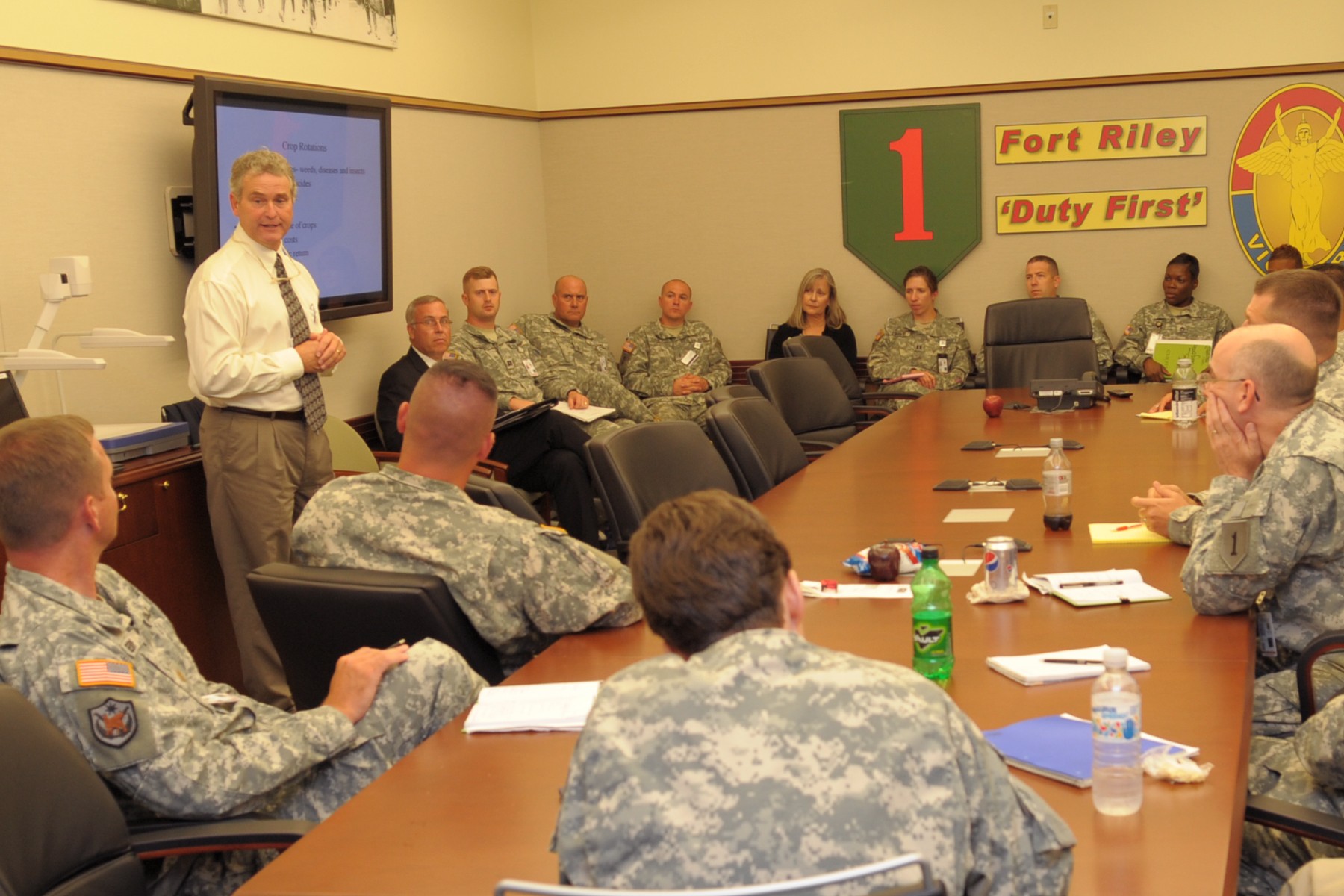
"This is a whole new kind of training for a whole new kind of mission," said Maj. Karrie Patterson, 1st Infantry Division G-5 planner.
Patterson was just one of the participants in a recent training event aimed to prepare 1st Inf. Div. leaders for their upcoming deployment and the challenges associated with stability and support operations in Iraq.
Government 101, which was Aug. 10-12 at Fort Riley and in surrounding communities, featured a combination of expert presentations and on-site visits to regional facilities. Representatives from Kansas State University, the city of Manhattan and other local communities instructed Soldiers on a wide range of government, economic, agricultural and infrastructure topics relevant to daily operations in Iraq.
"This is an awesome experience for us," said Patterson. "We are receiving training from different folks from the local community. What we are doing is learning what a good, small-run city looks like. And we are going to take that as training for a our new mission going into Iraq to help the Iraqi government and a small city come up and try to meet the same kind of standards, try to be able to sustain themselves and do some of the great things that Kansas is doing. Really, for us, it's more of a civil-support mission."
A new mission
The 1st Inf. Div. headquarters will deploy to Iraq at the end of the year. Division officials said the emphasis in Iraq is on helping the citizens with quality-of-life issues. Soldiers may be called to assist in restoring infrastructure or educating Iraqis on security and economic initiatives.
"The reason we are doing Government 101 training is that we recognize in our upcoming deployment to Iraq that we are going to need to understand many of the subtleties of how to help the Iraqi government function properly - how we can make them be more successful; how we can work with the community leaders in Iraq to help make life better for the Iraqi population," said Maj. Randal Hickman, 1st Inf. Div. operational research system analyst. "We recognize that as Soldiers we are very good at many things, but there are some things that maybe we need some help with. And one of those areas might be how to build or assist a government. It's outside of what we normally train for, and we recognize that's an area where we could really appreciate the assistance from experts."
Expert presentations
Training began Aug. 10 with expert presentations on the Iraqi government, agricultural opportunities in Iraq, community and regional planning and communication.
Joe Aistrup, professor of political science and associate dean of the College of Arts and Sciences at K-State, led the introductory session on the Iraqi governmental situation.
"When we talk about government, oftentimes, people have a pretty low opinion of what government does and how government interacts with our society," Aistrup said. "So you can imagine the problems that the Iraqis have anytime that they're thinking about their government and interacting with their government."
Aistrup, along with colleague Ayad Imad Ahmed, detailed the challenges faced in Iraq to include security issues, corruption in government structure, poor communication and coordination among national and local levels and government, tribal and clan influence, lack of infrastructure and the challenge of overcoming citizens longing for socialism and authoritarianism of the past.
"My advice to all of you is to do things small, do them well, and make sure it works," Aistrup said. "It's better to do things small and do it really well then to do something really, really large and do it poorly. So in everything you do, try to make sure you get it done right."
More in-depth breakout sessions included community development, global planning strategies in communities, economic and enterprise development processes, solid and liquid waste streams, composting, water and water purification, agricultural development, cropping systems, livestock systems, water management systems and irrigation.
On-site visits
Aug. 11 and 12 were characterized by on-site visits to the Manhattan Water Treatment Plant, wells field and pump station, a Manhattan firehouse, the Wamego Power Plant, the Annenberg Sub-station, the Riley Country Transfer Station and AT&T in Manhattan.
Participants learned about water purification, water infrastructure, electrical production and distribution, refuse collection and disposal and telecommunications.
"We recognize that in Iraq right now, that although there are many infrastructure issues that are of great importance, that electricity and water are two of the most important," said Hickman.
At the Manhattan Water Treatment Plant, 1st Inf. Div. Soldiers toured the plant and learned how the system operates.
"They are getting the opportunity to see an operating system in person. They can come in and look at it and learn how we operate," said Kenny Henry, superintendent of water treatment.
The Manhattan Water Treatment Plant produces about 20 million gallons of water a day, supplying about 250 gallons of water per person a day. And, Henry said, many people take clean water for granted.
"It's a big part of our infrastructure in this country, and without it we'd be in a lot of trouble," he said.
Patterson, who toured the facility Aug. 11, said she and fellow Soldiers learned that making water is a very intricate process.
"It's vital. It goes all the way back to caveman days - you've got to have food, water and shelter," Patterson said. "The important thing about, in particular that part of the world (Middle East), is that there is only so much water to go around, and how you manage that water is vital to actual survival."
A visit to the Manhattan firehouse allowed for discussions on petroleum distribution, water, electrical power, policing models, training theories, small business development, public education and public health.
Applying lessons learned
The three-day training was designed to prepare the 1st Inf. Div. leaders for the intricacies of running a city and establishing a government as they prepare for deployment.
"I think the most important takeaways from this week were that we saw how a successful, functioning city operates with all of its infrastructure and all of the services that the city government provides," Hickman said. "We also saw from an academic side - our friends at K-State - we learned academically how all of these systems should work."
Participants remained hopeful that this "new training" for a "new mission" would prove beneficial as they assist the Iraqi government in the near future.
"I really do hope that we go and the city that we go to and the people that we interact with at some point say, 'You know what' We've got it from here. Thanks,'" Patterson said. "I hope to go in and to continue to assist them in exactly the same manner, and I mean this seriously, in exactly the same manner that the city of Manhattan and the great brains at K-State have come in and helped us - get us smart, get us to a point where we can help someone else out and then, we'll see you later. That's my goal; that's our goal."

Social Sharing